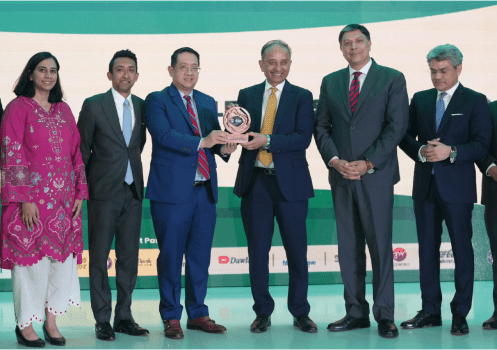Mr. Chandi Raj Dhakal, President (Elect) of the SAARC Chamber of Commerce and Industry (SAARC CCI), led a high-level South Asian delegation to China to attend the 18th China–South Asia Business Forum (CSABF) held in Yuxi City, Yunnan Province, from October 15 to 16, 2025, and the China–South Asia and Southeast Asia Commercial Legal Cooperation Forum held earlier in Kunming City.
Representing Pakistan, Mr. Zulfiqar Ali Butt, Secretary General of SAARC CCI, participated in the Forum and highlighted Pakistan’s strategic role as a key partner in regional connectivity and trade facilitation.
Speaking on the occasion, Mr. Butt noted that the China–Pakistan Economic Corridor (CPEC) has emerged as a transformative initiative that enhances infrastructure, industrial development, and logistics capacity not only for Pakistan but for the entire South Asian region. With over USD 25 billion in completed projects and the operationalization of Gwadar Port, CPEC stands as a vital link connecting South Asia with Central Asia, the Middle East, and China.
He emphasized that the success of CPEC under the Belt and Road Initiative (BRI) demonstrates how regional partnerships can unlock shared prosperity through connectivity, innovation, and sustainable growth.
Mr. Dhakal, representing the collective voice of the South Asian private sector, emphasized the region’s shared responsibility to foster stronger economic, legal, and investment cooperation with China and ASEAN.
In his address, Mr. Dhakal highlighted the vast potential of regional collaboration, noting that “South Asia, ASEAN, and China together represent over 40% of the world’s population and nearly one-third of global GDP.” He added that while China–ASEAN trade reached USD 911 billion in 2023, China’s trade with South Asia — including USD 1.8 billion with Nepal alone — continues to expand steadily.
Mr. Dhakal further invited deeper collaboration between SAARC CCI and CCPIT’s legal services network to build a harmonized framework that supports inclusive regional growth.
The Business Forum brought together senior government officials, business leaders, and representatives from chambers of commerce across South Asia and China to explore new avenues of regional trade and investment cooperation.
At the inaugural session, Ms. Jyotsna Shrestha, Vice President of the Federation of Nepalese Chambers of Commerce and Industry (FNCCI) and Executive Committee Member of SAARC CCI, appreciated China’s consistent engagement with South Asian economies and highlighted the importance of inclusive growth and women’s participation in regional trade.
Mr. Md. Alamgir, Secretary General of the Federation of Bangladesh Chambers of Commerce and Industry (FBCCI), stated, “From the Belt and Road Initiative to breakthroughs in AI, 5G, health technology, fintech,
and green innovation, China has shown the world how to build and harness new productive forces at scale. China is a role model for South Asian nations.”
Mr. Keerthi Gunawardane, President of the Federation of Chambers of Commerce and Industry of Sri Lanka (FCCISL) and Executive Committee Member of SAARC CCI, remarked that Sri Lanka’s socioeconomic relations with China and other South Asian countries have remained steady and friendly throughout history. He emphasized that by deepening economic ties and establishing closer trade links, South Asian countries can work toward creating a more cohesive and interconnected regional market, fostering greater integration within South Asia, and enabling the smoother movement of goods, capital, and services.
A key highlight of the event was the signing of a Memorandum of Understanding (MoU) between the China Council for the Promotion of International Trade (CCPIT) Commercial Legal Service Center and the SAARC Chamber of Commerce and Industry Center for Mediation. The MoU establishes a cooperative framework for enhancing commercial legal services, mediation, and dispute resolution aimed at building business confidence and fostering sustainable regional integration. The agreement was signed on behalf of SAARC CCI by Mr. Chandi Raj Dhakal.
On the sidelines of the forum, a China–South Asia Business Council Working Meeting was convened, attended by SAARC CCI representatives including Mr. Chandi Raj Dhakal (Incoming President, SAARC CCI), Dr. Rohitha Silva (Vice President, Sri Lanka), Mr. Keerthi Gunawardena (Executive Committee Member, Sri Lanka), Mr. Md. Alamgir (Bangladesh), Ms. Jyotsna Shrestha (Executive Committee Member, Nepal), Mr. Zulfiqar Ali Butt (Secretary General, SAARC CCI), and Mr. Tilan Wijesooriya (Associate Director, SAARC CCI).
The meeting reviewed the outcomes of the 18th CSABF and discussed key priorities, implementation strategies, and institutional frameworks. Additionally, the meeting formally announced the rotating Chair for the 19th China–South Asia Business Forum.
During the meeting, Mr. Liu Qilin, Chairman of the CCPIT Yunnan Sub-Council, expressed his gratitude to the SAARC Chamber of Commerce and Industry for its continuous support and partnership in promoting regional business cooperation.
Sri Lanka served as the Chair of this year’s Forum, and Mr. Keerthi Gunawardena led the Sri Lankan delegation comprising prominent business representatives from Sri Lanka. At the conclusion of the meeting, Mr. Md. Alamgir, Executive Secretary of FBCCI, Bangladesh, formally accepted the Chairmanship for the 19th China–South Asia Business Forum, to be hosted by Bangladesh next year.
Mr. Dhakal commended the organizers for their efforts and reaffirmed SAARC CCI’s dedication to strengthening people-to-people linkages, enhancing regional economic cooperation, and advancing shared prosperity across South Asia and China.
Mr. Zulfiqar Ali Butt proposed that future forums ensure the participation of trade ministers and recommended enhanced coordination between national chambers and Chinese embassies for improved implementation and follow-up mechanisms.
The Forum concluded with a shared commitment to deepen legal and economic cooperation between China, South Asia, and ASEAN, reinforcing the spirit of partnership and mutual growth across the region.
South Asia Strengthens Regional Business Ties at the 18th China–South Asia Business Forum (CSABF)







